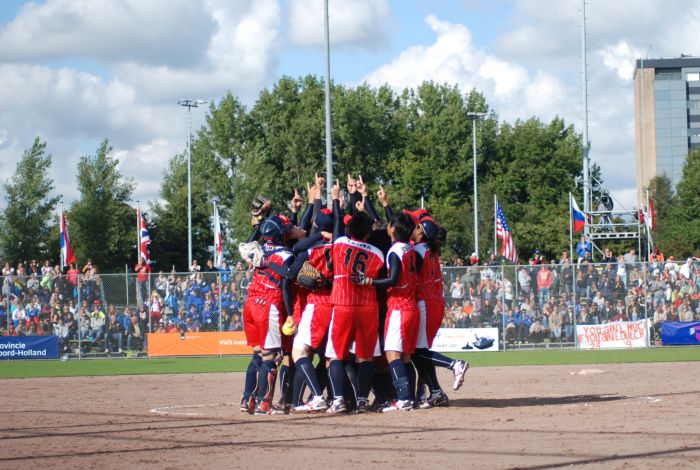
by Bob Fromer
Haarlem, Netherlands – Japan is still the best softball team in the world, and Yukiko Ueno is still the world's best pitcher, and that's why Japan won its second straight World Championship here on Sunday afternoon, beating the USA in the Grand Final by 4-1.
Earlier in the day, in a rather low-key game where both sides seemed to know who would win from the beginning, the USA defeated Australia 8-1 on the mercy rule after six innings. That result gave Australia yet another bronze medal and sent the USA to the final against Japan.
The USA took a 2-0 lead in the first inning on a two-RBI single by Sam Fischer and made it 4-0 in the third off Australian starter Kaia Parnaby on another two-run single by Valerie Arioto.
Australia scored a lone run in the fifth inning after Chelsea Forkin's lead-off triple, but a successful suicide squeeze for the US took the score to 5-1 in the fifth and a double by shortstop Kellie Fox in the bottom of the sixth ended the game on the mercy rule.
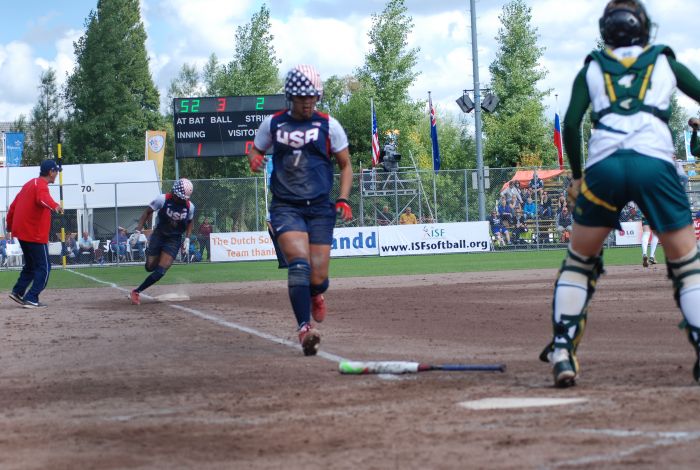
Scratch and claw
The final was a very different game from the earlier Page Playoff contest between Japan and the USA on Saturday evening, where Yukiko Ueno dominated the US hitters and Japan won easily by 6-1.
During the Grand Final, the 32-year-old Ueno was clearly tired from pitching twice on Saturday and didn't have anything like her usual velocity. And the USA had a definite plan, which was to have the three quick left-handed hitters at the top of their line-up punch the ball through and over the left side of the Japanese infield as much as they possibly could.
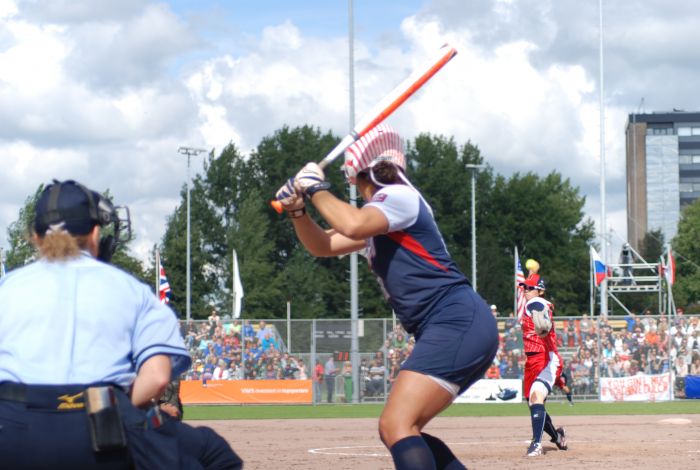
This plan worked really well, as Raven Chavanne, Kelsey Stewart and Michelle Moultrie got on base six times between them over the course of the game. The USA had eight hits and two walks and there were American runners on base against Ueno in every inning except the sixth. In three innings, the USA got their first two runners on base with no one out.
But only one US run ever scored, in the bottom of the fifth inning, and in every other instance Yukiko Ueno and the Japanese defense found a way out of the situations they were in.
When she had to get a strikeout, Ueno would find a devastating rise ball, or the change-up that freezes hitters like a stone. The Japanese, of course, made no errors (neither did the USA), and in the fifth inning, when the US did score, the threat was defused when Japanese third base player Yu Yamamoto dived at a smash off the bat of Lauren Gibson, the ball ran to Rei Nishiyama at short, she made a quick flip towards second and second base player Haruna Sakamoto picked the throw out of the dirt for a force out.
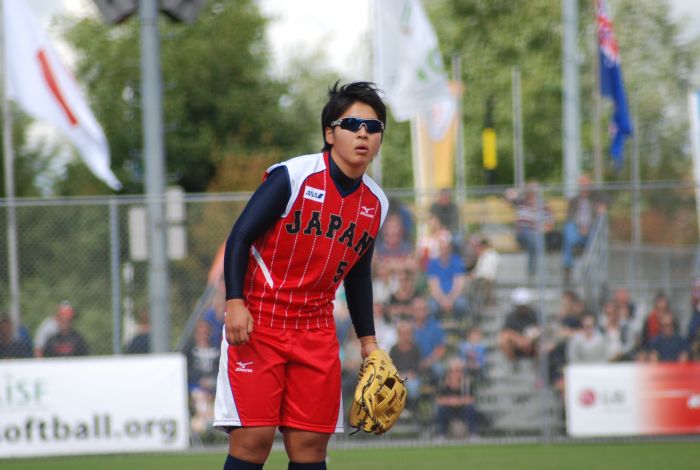
Turning point
USA Coach Ken Eriksen tried everything he could, especially in the pitching department. Starter Jessica Moore failed to last the first inning, after which Sara Nevins, Jackie Traina and then Moore again took to the circle, and they largely kept the Japanese quiet.
But Japan had already pretty much won the game in the top of the first inning, when they scored three runs. Shortstop Rei Nishiyama worked a walk with one out, Masato Kawano sacrificed her to second and Eri Yamada was walked intentionally – Ken Eriksen wanted no part of the Japanese clean-up hitter. But it wasn't part of the plan for Jessica Moore to walk catcher Yukiyo Mine to load the bases with two out.

The US needed to get out of that situation without damage – but the next two Japanese batters did what the Japanese do. Haruna Sakamoto drove a single between third and short, and Rei Nishiyama and Eri Yamada streaked home. Designated Player Minami Sato then drove the first pitch she saw for another single between first and second, Yukiyo Mine scored, and Jessica Moore was out of the ball game. Sara Nevins came in and struck out Rie Nagayoshi to end the inning.
Though a lot of things happened in the six-and-a-half innings that followed, and the US had endless chances, it was hard not to feel that those three runs in the top of the first would be enough for Ueno and Japan. And in the end, they were.
The Japanese added a fourth run in the top of the fourth inning and ended Sara Nevins's part in the game. With two out and no one on base, Yu Yamamoto, Rei Nishiyama and Masato Kawano punched successive ground ball singles to or through the US infield.
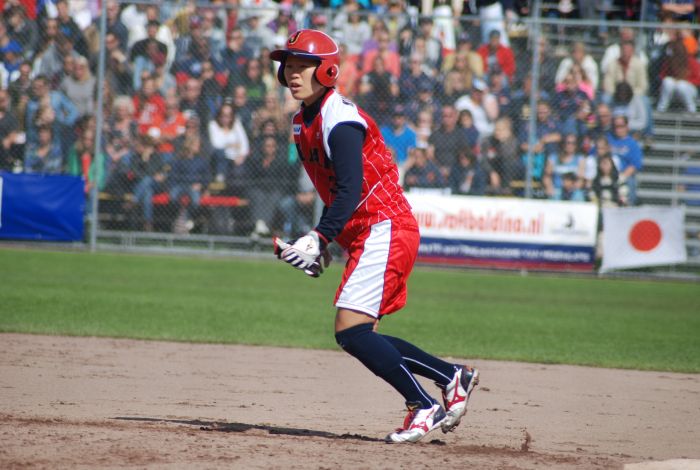
US lagging behind
The World Championship final in Haarlem, like the one in Whitehorse in 2012, the Olympic final in 2008 and other occasions over the past few years where the US and Japan have met, showed yet again that the two countries have a very different approach to softball, and right now, the Japanese approach, especially when combined with a pitcher like Yukiko Ueno, works better.
The Japanese approach is all about speed, putting the ball in play, athleticism and instinct on defense and a varied pitching repertoire where any pitch can be thrown on any count or in any situation. And it helps that most of this Japanese team has played together for many years, while Team USA, unlike in the past, tends to have a quick one-to-two-year turnover of the latest college stars, combined with a few veterans.
In Japan, there is perfect synchronisation and reinforcement between the thriving professional league and the national team; in America, the Team USA organisation and the small and struggling professional league barely speak. The Americans understand the issues, but seem powerless to solve them.
Until they do, Japan is likely to continue to be the best softball team in the world.
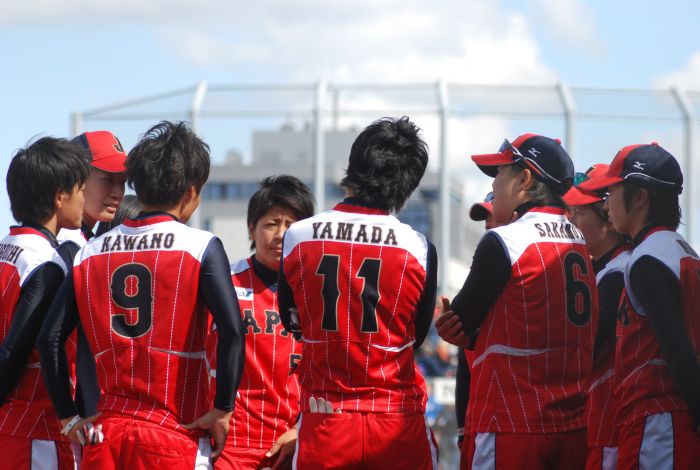
Final standings
Here are how the teams finished in the 14th ISF Women's World Championships in Haarlem, with the bottom eight having to be ranked on pool results after the rain on Friday forced all Consolation Playoff games to be cancelled:
1 – Japan
2 – United States
3 – Australia
4 – Canada
5 – Chinese Taipei
6 – Netherlands
7 – China
8 – New Zealand
9 – Cuba
Italy
11 – Czech Republic
12 – Dominican Republic
13 – Russia
14 – Botswana
15 – Puerto Rico
16 – Great Britain
Great Britain finished 11th in team batting, but 15th in team pitching and 15th in team fielding (ahead of only Botswana in those last two categories), and that tells some of the story of GB's tournament.
But in terms of individual batting, among players with a significant number of at-bats, GB first base player Alicja Wolny ranked third with an average of .583.
However, with strong reinforcements ready to come up from this summer's successful GB Under-19 Team, the GB Women will be a stronger team next summer at the European Championships and then at the next World Championships in Surrey, British Columbia, Canada in 2016.
_700x470.jpg)
Photos by Lynda Medwell
